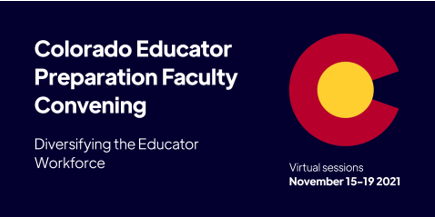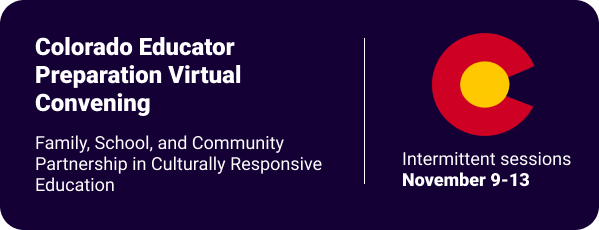Please join us for this opportunity to learn with and from each other about diversifying the educator workforce as an equity imperative in educator preparation. Together we will share and learn about high-impact strategies that educator preparation programs use to foster a stable teaching profession that more accurately reflects the racial, ethnic, and linguistic diversity of our state.

PLEASE CLICK ON THE DATE AND TIME LINK TO VIEW THE RECORDING OF EACH SESSION.
EVENT KICKOFF AND KEYNOTE
Monday, November 15th 10:00 – noon
Diversifying the Educator Workforce: An Equity Imperative
Dr. Margarita Bianco is an Associate Professor in the School of Education and Human Development at the University of Colorado Denver. Professor Bianco teaches undergraduate and graduate courses in teacher education at the University of Colorado, Denver. Dr. Bianco's research examines the recruitment and retention of teachers of color. Her focus is on diversifying the teacher workforce by implementing GYO pre-collegiate teacher pathway programs for high school students of color.
BREAKOUT SESSION: Candidate Advocacy & Addressing Financial Barriers in Teacher Education Dr. Ashley Cartun, Mary Beth Snow Balderas, Lizz Bohl, University of Colorado Boulder
Based on national quantitative data and this study’s qualitative research, we will present teacher candidates’ (TCs) perspectives about financial challenges during teacher preparation, the ways that these challenges can form a barrier to learning, and TCs’ recommendations for improving their experiences. Attendees will put these perspectives into conversation with the resources and constraints of their own institutional contexts and learn from one another through cross-institutional dialogue. Collectively, we will grapple with the tensions that exist between the financial barriers to becoming a teacher and robust teacher preparation, and we’ll consider what we can do as a teacher preparation community to address these barriers to becoming a teacher in Colorado.
Tuesday, November 16th, 12-1:00
ROUNDTABLE SESSION: Trials, Successes, and Ideas for a Continued Trajectory to Faculty Diversification Dr. Chalane E. Lechuga, Dr. Ofelia Schepers, and Dr. Michael Benitez, Jr., Metropolitan State University of Denver
On college campuses across the United States, the racial and ethnic demographics of student populations have shifted. In addition, research has documented the profound and significant impact Black, Indigenous and People of Color (BIPOC) faculty have on retention and graduation of all undergraduates. Thus, it is imperative for higher education administrations to consider ways to recruit, retain, and support a more demographically representative professoriate. This roundtable will discuss the faculty retention research and strategies to increase recruitment, retention and success of faculty that have been implemented at Metropolitan State University of Denver, a federally designated Hispanic and Minority Serving Institution.
Tuesday, November 16th, 1-2:00
BREAKOUT SESSION: Trauma-Informed Practices in Teacher Preparation Anna Joseph, Dr. Ofelia Castro Schepers, and Dr. Kathryn Young Metropolitan State University of Denver
Presenters will share Trauma-Informed Practices (TIP) as a tool for social emotional health and trauma informed teaching. Presenters will provide a framework for connecting TIP to culturally responsive teaching, and examples of how to be trauma-informed educators in higher education and incorporate TIP into preparation programs.
Wednesday, November 17th, 10-11:00
BREAKOUT SESSION: Creating the Culturally Responsive Teacher in 126 Credits (or Fewer): One Program’s Journey Towards Equity and Justice Dr. Jeraldine Kraver, Dr. Stacy Bailey, Simon Cropp, University of Northern Colorado
The demographic gap between teachers and students is significant, and TCs often have a limited understanding of the communities and experiences of the students they will teach. Our Secondary English Education program has been designed to create culturally responsive teachers who possess an in-depth understanding of the cultural and social experiences of the diverse populations of the secondary classroom. Our presentation addresses how we prepare TCs to use ELA content and culturally responsive pedagogical practices in order to meet the needs of all their students, including a tool called The Opportunity Atlas.
Wednesday, November 17th, 11-12:00
BREAKOUT SESSION: Supporting Diverse Aspiring Educators with Targeted Resources Annette Konoske-Graf, TEACH Colorado
A recent TEACH survey showed that 73% of Black and 75% of Latinx high school and college students would join an identity-based affinity network to support them on their paths to teaching. In addition to sharing TEACH Colorado's new resources dedicated to future Black and Latinx teachers, we will discuss how other institutions are currently providing customized resources and support to these candidates. We will also identify additional opportunities for support that TEACH Colorado should be highlighting and promoting.
Wednesday, November 17th, 1-2:00
BREAKOUT SESSION: Diversifying the Workforce: The right fit, right person, right context, and right time Dr. Valerie Sherman, Liliana Flores Amaro, Dr. Tania Hogan, Dr. Suzanne Arnold, Dr. Cindy Gutierrez University of Colorado Denver
Over the past 8 years, CU Denver has invested in creating multiple undergraduate preparation pathways that promote growing teachers from local communities for specific contexts. The presentation will address brief descriptions of the high-impact recruitment strategies, how novice educators learn to incorporate culturally responsive practices into their pedagogy, and the support systems used to assist teacher candidates throughout their plans of study. Participants will then hear a panel discussion with teacher candidates and district partners who are engaged in the work followed by a Q&A session where participants will be able to interact with members of the panel and presenters.
Wednesday, November 17th, 2-3:00
BREAKOUT SESSION: The Crucial Role of the Principal in Building and Maintaining a Culturally Diverse Workplace Dr. Georgina Garcia and Dr. Dan Jesse, Western Educational Equity Assistance Center at Metropolitan State University of Denver
Principals are essential in the hiring process for engaging and retaining diverse candidates for schools. This session will cover what current literature has to offer about the crucial roles of the principal, how to drive diversity in hiring and retention when principals of color are not in place, critical roles for hiring and diversity and how to lead cultures and staff to nurture, perpetuate, and protect the culture. Participants will take part in interactive scenarios to illustrate what parents, students and teachers have to say about these complex issues. Best practices will be described to create cultures of equity and lessons from the field will be summarized.
Thursday, November 18th, 12-1:00 ROUNDTABLE DISCUSSION: Building Cultural Competence - Preparing Apprentice Teachers to Teach in Urban Contexts
Dr. Anderson and Dr. Schmidt tackle a pervasive problem of practice across institutions, one that is central to our Teacher Education Program: how do we support mostly white educators and future educators of color to teach predominantly students of color in urban contexts through culturally responsive pedagogy? There will be four parts to this roundtable: A focus on our current contexts; a discussion of our current culturally responsive practices; a discussion about current inequities and issues in providing culturally responsive practices for our preservice teachers and a call for ways we can support one another to solve this problem of practice across institutions in our future work.
Thursday, November 18th, 1-2:00
Culturally Responsive and Sustaining School Leadership: An Interactive Dialogue
PANEL DISCUSSION: Dr. Susan Faircloth, Colorado State University, Dr. Kathy Schultz, University of Colorado Boulder. Panel led by Dr. Brittany Lane Colorado Department of Higher Education
Dr. Faircloth and Dr. Schultz will discuss how culturally responsive and sustaining leadership is essential for shifting who enters educator preparation programs. The panelists will reflect on their vision as leaders and talk about potential barriers and strategies for change. Participants will also have an opportunity to ask questions.
Friday, November 19th, 11-12:00
ROUNDTABLE DISCUSSION: Laying the Groundwork for Diversity in Teacher Education Dr. Nhu Nguyen-Siedem, Dr. Dorothy Shapland, and Dr. Janelle Johnson Metropolitan State University of Denver
This roundtable session brings together 3 specialty areas of teacher education at MSU Denver. We’ll discuss what teacher preparation can do to lay the foundation for change and to diversify teacher education.
We’ll discuss levels of change including a) what individual faculty members and committees can do, b) what departments and schools can do, c) university, and d) state level support.
Friday, November 19th, 12:30-2:00
PANEL DISCUSSION: If Education is a Fundamental Right – Shouldn’t a Diverse Educator Profession be a Right Too? Dr. Manuel Espinoza and Maria Karina Sanchez Velasco, University of Colorado Denver/Right to Learn Undergraduate Research Collaborative, Dr. Roberto Montoya, Colorado Department of Higher Education
Dr. Espinoza, Maria Karina Sanchez Velasco and Dr. Montoya will discuss the work of the Right to Learn Undergraduate Research Collaborative to amend the Colorado Constitution to include education as a fundamental right and the importance of teacher diversity and educational dignity. Participants will also have an opportunity to ask questions.

Thank you to all who were able to attend this virtual convening – we had great attendance and amazing engagement! If you were unable to attend or would like to re-view one of the sessions, please see the links and shared materials below.
EVENT KICK-OFF AND KEYNOTE:
Monday, November 9th 10:00 – noon
Culturally Responsive Family-School-Community Partnerships: Opportunities in Teacher Preparation Programs
Dr. Mavis Sanders, University of Maryland Baltimore County. Mavis G. Sanders is affiliate professor in the doctoral program in language, literacy, and culture at the University of Maryland, Baltimore County (UMBC). She teaches courses on cultural diversity, research designs in education, and teacher leadership as well as independent studies for doctoral students with interests in community development, education policy and reform, and program evaluation. Her research focuses on improving schools and educational outcomes for underserved youth through school, family, and community partnerships.
Student Panel Keynote Dr Mavis Sanders Video Recording
Family, School, and Community Partnership in Culturally Responsive Education Presentation Slides
Tuesday, November 10th, 10-11:00
STUDENT PANEL: Fort Lewis College Students Discuss Equity and Family Engagement
Dr. Kristine Greer, Fort Lewis College. Dr. Greer speaks with pre-and in-service teachers on their experience with equity and family engagement.
Student Panel: Fort Lewis College Students Discuss Equity and Family Engagement Video Recording
Tuesday, November 10th, 11-12:00
FACULTY PANEL: Colorado Prep Providers: Incorporating Family Engagement
Dr. Brittany Lane, Colorado Dept. of Higher Education.
Hear from providers who focus on family engagement strategies.
Faculty Panel: Colorado Prep Providers: Incorporating Family Engagement Video Recording
Wednesday, November 11th, 9:30 – 11:00
BOOK STUDY: Dr. Adeyemi Stembridge author of Culturally Responsive Education in the Classroom: An Equity Framework for Pedagogy.
Dr. Rosanne Fulton, University of Northern Colorado, Center for Urban Education leads a discussion with author Dr. Stembridge of Chapter 3: The Six Themes of Culturally Responsive Education and the implications for Educator Preparation.
Thursday, November 12th, 10-11:30
Four Essential Elements of Sustainable and Systemic Family, School, and Community Partnerships.
Dr. Darcy Hutchins, Colorado Department of Education.
Dr. Hutchins, Director of Family, School, and Community Partnerships provides an interactive presentation to share the essential elements of FSCP.
Family-School-Community Partnerships: Four Essential Elements Presentation Slides
If you would like to learn more about incorporating family, school, and community partnerships into educator preparation, please join the community of practice by indicating your interest here. The first meeting will be held in February, 2021 to discussion a vision for the community of practice
The Colorado Department of Higher Education supports institutions as they prepare educators to serve the state, country and globe. All educator preparation programs must be approved by the Colorado Department of Education and CDHE and are subject to comply with all appropriate laws, rules and statutes relating to educator preparation.